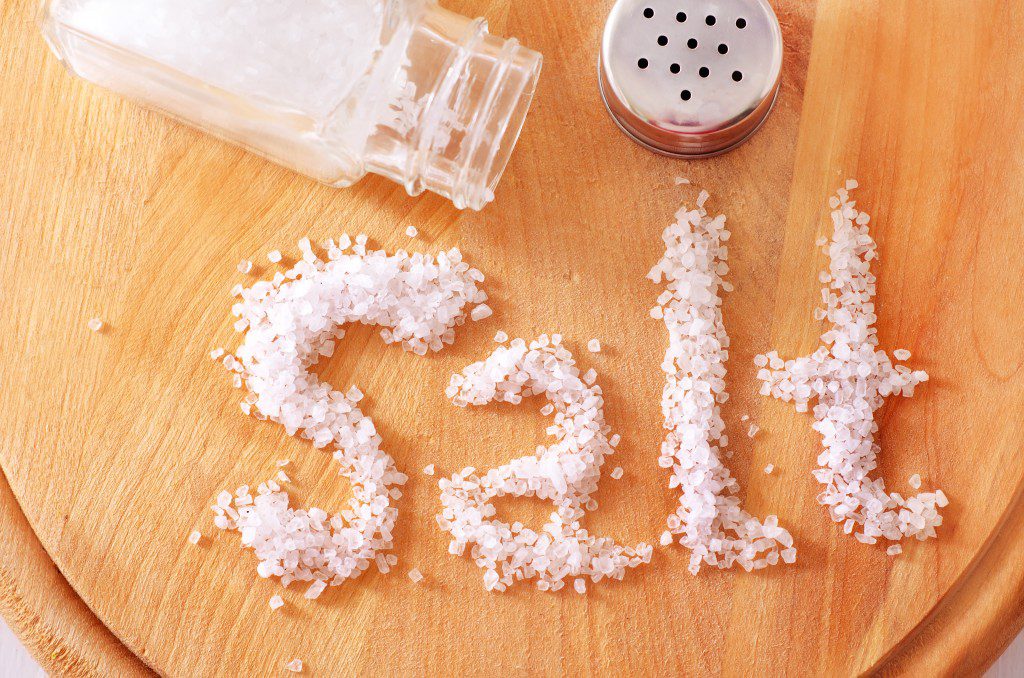
Salt is one of the most versatile things in the world. Two elements, sodium and chloride, bind together to form a compound that can sustain life or snuff it out. Salt makes up nearly half of percent of our bodies. We, like all mammals, crave salt–we need to take it in to maintain our health. Without the proper amount of it, we can’t transmit nerve impulses, contract and relax our muscles, or maintain a proper balance of bodily fluids. Yet, we only need a small bit–too much can lead to serious problems, way too much can kill us.
The Bible talks about salt a lot. Metaphorical biblical references to salt are both positive and negative.
Salt is like that.
I see salt as a metaphor for the way Christians respond to society–indeed, the way I respond to society. I tend to break it down to four categories. Two of the categories have a positive impact and two have negative consequences. In the interest of full disclosure, I should admit right up front that I have been all four of these types of salt. I’ve used my salt for good and bad.
Salt is like that–I am like that.
Salt Burns and Irritates
It is a famous expression–rubbing salt in the wound.
How many times have you seen a Christian kick someone when they are down? We see a brother or a sister fall and instead of reaching out to pick them up, we look down upon them in judgement and say or do something that makes them feel worse. I can still remember an incident when I was a child, when a stranger wandered into our small town church’s evening service. He was dirty, smelly, and dressed in tattered, scroungy clothing. He seemed nervous and fidgety. He looked out of place and somewhat “suspicious.” I remember that I was very aware that most people in the congregation seemed not to be paying any attention to the sermon but rather, kept stealing concerned glances at the stranger. I recall a couple people getting up and going to the lobby outside the sanctuary. A moment later, an usher came in and discretely whispered something to the stranger. After that, the stranger got up and sheepishly walked out of the sanctuary. Even a youngster like myself could put two and two together and figure out what happened there. Some folks in my church didn’t like the looks of a stranger in their worship service and asked him to leave. It was as if they said, this is a place for Christians to gather, you don’t look Christian enough to be in church. That was some bad salt. Over the years, I’ve often wondered what became of that stranger. I know he didn’t get a very good impression of Christians from my church that day.
In recent years, I’ve seen similar situations unfold countless times in comment sections on social media. It seems like Christians can be way too quick to pour bad salt into open wounds. Salt can irritate wounded people and drive them away.
Salt is like that.
Salt Kills Soil and Prevents Growth
For centuries, salt has been used against enemies to ruin their crop fields. “Salting the earth” has been practiced as a weapon of warfare. At times, when one people conquered another, they would treat the fields of the conquered society with salt to prevent them from being able to quickly recover, thus keeping them in a weakened condition for extended periods of time.
I have seen Christians salting the earth in different ways in recent times.
I have seen Christians use carefully selected portions of the Bible to justify the revoking of hard-fought legal rights from women and the LGBTQ community. The inevitable result of their efforts has caused a great divide that has doubtless driven many people far from the message of Christ.
I have seen millions of Christians line up to vote for Donald Trump and then take glee in the misery of their “snowflake” brethren. They have sown salt into the fields of progress and it remains to be seen how long those fields will lie fallow–but the prognosis seems bleak. Salt can halt progress.
Salt is like that.
Salt Can Bring Out Flavor
How bland would some food be without salt? Salt has a way of bringing flavors out in food that remain hidden without it.
Just as a proper dose of salt can bring out the flavor in food, a proper dose of perspective can bring out empathy in a debate. We are not ever going to agree with each other about everything. it’s not possible, and it’s not even something we should strive for–consensus is overrated. But if we use our salt of perspective carefully and thoughtfully, and we are willing to be spiced by the salt of perspective from others–by listening–we can bring out the savory empathy in each other.
Empathy is in short supply. We need to be willing to share our salt respectfully–giving perspective and receiving it from others. Without this exchange, we will walk the world as bland, tasteless beings, never realizing our beautiful potential.
Salt can bring out the best in what it’s allowed to permeate.
Salt is like that.
Salt Can Preserve
For much of human history, keeping food from spoiling was a difficult proposition. Without refrigeration, perishable food items, like meat, will quickly turn rancid. Salt has been used to solve this problem for centuries.
Christians, at our best, can use our salt as a preservative.
We can use our salt to pray. When Christians come together in earnest, fervent prayer, the power is often palpable and the results can be miraculous.
When I was very young, a man in my home church–and a close friend of my parents–was severely burned in a tragic explosion where he worked. He was at death’s door and not expected to live. The people of my little church, and many in the town at large, began a non-stop, ’round the clock prayer vigil. The burned man miraculously pulled through and after a series of surgeries and skin grafts, he made a full recovery–in fact, he ended up being one of my high school basketball coaches. That series of events and the extraordinary example of the power of prayer was eventually immortalized in a song, I’m So Glad I’m a Part of the Family of God, written by the two most famous residents of my little home town–and members of my little church at the time of that tragedy–gospel music legends, Bill and Gloria Gaither.
We can also use our salt in loving support.
When we see struggling people, like that stranger who straggled into my church long ago–yes the same church that came together to pray for the burned man–we can reach out to them and help to lift them up. Jesus was a consistent example of how we should use our salt to support the least of these, our brothers.
Salt is like that.
As I said at the beginning, I’ve used my salt in all four of the ways I laid out above. I’m guessing most of you have, too. I mentioned the little small town church of my childhood twice, using salt to harm and to help.
Salt is like that.
How will you use your salt today?












